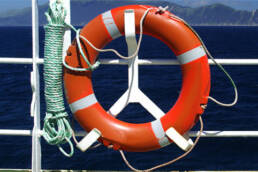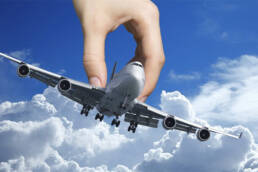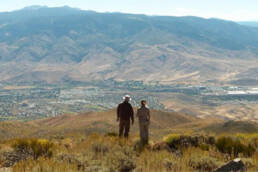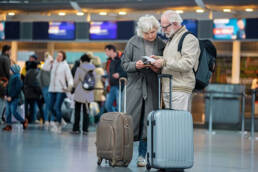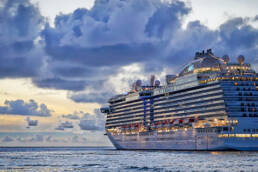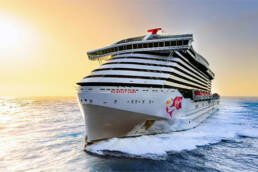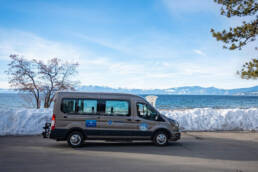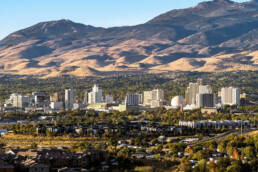Hoping all is well with everyone. By the time you read this article the Super Bowl will have happened, Valentines will have passed, and we’ll all be on to the St. Paddy’s Day planning huh? I got to thinking about what has been happening over this past week and thought it necessary to write something about air travel, in light of the fact there have been two(2) terrible instances just recently.
In the last 4 days (I’m writing this on Feb. 2nd) there have been two (2) horrific flight crashes and I am sure we all are going to be a tad more nervous than maybe we would have been a little over a week ago. I know I am. I will be flying to Ft. Lauderdale in the middle of this month for our annual Jazz Cruise, a chartered event. We will be traveling on Southwest Airlines. I know that their record for flight safety is pretty good. I did some research and decided to share what I learned with all of you. Obviously; air travel is an integral part of plans I help clients make to go most places. Some travel by car, but to tell the truth, more accidents happen while driving than in the air. Sooo, you might ask: What is the safest airline in the U.S.?
According to one of my sources, the Air Advisor Airline Safety Score found in Oct. 2024 that the following airlines have good records: Alaska Airlines, Allegiant Air, American Airlines, Hawaiian Airlines, Southwest Airlines, Spirit Airlines and United Airlines. Needless to say, I was thrilled that Southwest was among them HA.
Statistically I learned that most commonly the air crashes are occurring in single engine planes and generally private and not commercially flown planes. Fact is, 79% of all aircraft accidents and 72 of fatal crashes involved single engine planes. Maybe that stat will help relieve some anxiety.
There has been discussion about Control Tower hiring and training. It would be negligent for me to exclude a discussion about that in this article. It is true that over the past four (4) years, the hiring practices were regulated terribly and restricted to ignoring well qualified individuals from being hired. Sadly, the FAA has record of thousands of applicants filing suits against the government for discriminatory hiring practices. Consequently, there has been a shortage of personnel in this crucial profession. That is being rectified now with a new administration. The particular concern has been regarding the busiest airports. But that is only part of it.
According to my research after asking myself, What is the #1 cause of plane crashes? I learned it is relative to Pilot Error. Pilot training is lengthy and the knowledge of all the mechanical components of an aircraft, hand-eye coordination skill to effectively and safely maneuver an aircraft, experience helps each pilot develop a talent for ‘thinking ahead’. Even with the issue of pilot shortages, in 2023 there were record-low fatality risk rate. The statistic was “0.03 per million sectors”. What does that mean in common language I can understand? “On average, a person would have to travel by air every day for 103,239 years to experience a fatal accident”. That was a report from CNN .
Another statistic that may put some anxiety to rest, the Accident rate per one million flights is 0.80 or one accident per 1.26 million flights. (2023).
What might the other cause be for airline crashes? The 2nd issue is equipment failure. That has been determined to be the probable cause of the medivac flight this past week in Philadelphia. This cause does account for up to 20% of aviation crashes. Poor repair. Commonly the reason for small non-commercial aircraft. There have been improvement in manufacturing and design making for much more reliability.
Another common cause is Weather. Flying is so much more dangerous where traveling in bad weather. Commercial airlines will halt flights, delay flights etc. Private aircraft and non-commercial passenger flights are very cautious regarding this too, but not always. Accidents on these types of planes are most commonly reported i.e. chartered flights on regional flight equipment.
It is important to note that, while traveling by air, there is a tremendous amount of trust relied on to for air safety. These personnel are the maintenance engineers, air traffic controllers, flight dispatchers, a lot of people for EVERY DEPARTURE!
So what is the highest chance of survival in the event of a crash? My hubby and I ALWAYS choose aisle seats over the wings. According to statistics, the best chance of survival is the back of the plane and the mid-plane is next best. The front of the plane, oddly where you’re likely to find 1st Class, is the most dangerous.
By the way, I suggest that any of you planning on a flight, be sure to visit www.seatguru.comThere you can enter the airline name, flight number and equipment and you’ll see a lot of information to help in your seat selection. It will color-code the plane seat map. Yellow seats have CAUTION (maybe a tad narrower or something than most of the other seats have for example), Red seats are BAD ones in that they may not recline or only recline a little bit. Maybe the particular seat doesn’t have plug-ins for charging phones or whatever.
FOOTNOTE: My only reminder when booking your flights, if you are booking a DIRECT or NON-STOP flight, these are two (2) different things. A DIRECT FLIGHT only means that the flight number is the same the entire trip, no change of planes BUT, the sucker could be stopping multiple times across the country to get to your destination. A lot of people believe tat DIRECT is the same as a NON-STOP, but the NON-STOP means just that – the plane will NOT stop between departure and arrival airports. Note: Airlines are notorious for changing equipment too, so an original non-stop can become an itinerary with a connection.
I added the last paragraph cuz I got to thinking about that important fact. When choosing an airline seat, just be aware that the equipment can change and you’ll be at the mercy of the airlines regarding seat selection.
Back to flight safety…How about I list some tips for reducing any fear of flying? Mind you, easier said than done. I found eight (8) tips on one website https://www.ef.edu
Do not fear turbulence
Don’t worry about other scary things
Download and app or two (2) to keep you busy
Distract yourself (Be a people watcher, that can be fun believe me)
Practice relaxation exercises.
Tell the crew or a fellow passenger if and when you are uneasy
You should face any fear with professional help…there are people who get panic attacks, more common than one might believe.
Focus on what’s at the other end of your trip, looking forward to something pleasant.
I’ve been asked, What is the safest airlines report released as late as Jan. 2025 – the answer Alaska Airlines.
As reported in 2024 from info from 2023 a study of the numbers related to complaints about airlines: American Airlines had the most complaints that year BUT it also had the most passengers and flights. Frontier had the worst ratio of complaints to passengers based on the Department of Transportation (D0T’s) statistics. Alaska had the best complaint ratio followed by Southwest and Delta. Frontier, Spirit and JetBlue had the most complaint volume.
Back to safety: According to experts, both Boeing and Airbus are extremely safe, with the Airbus having a better accident record that Boeing.
Interesting to note also, IF you survive a plane crash, is there compensation? Yes. At present time an IATA (International Airline Travel Association) agreement provides for a minimum payment to each passenger’s family or 100,00 SDR (Special Drawing Rights, an international monetary unit) that equates to approx.. $140,000 presently though that can change.
I hope this information will help as you make a decision to travel, whether domestically or internationally. I’ve flown so many times and have had anxiety only during turbulence, I hate that!! Other than that, except for hating the food, for the most part, I’ve been pretty comfortable while in the plane. It’s the delays, missed flights, long layovers, and the worst, forced over-nights. That happened to us on our last long trip. A delayed departure, a missed connection, had to get a hotel (on us as the missed connection was weather related and that is considered an ACT OF GOD) so the hotel was on our dime, YUCK!!! Crap happens. I will be honest though, there will be a tad of apprehension in mid-February when we depart for Florida. We’re only human, this past week was nerve-wracking, I will still be praying for a safe trip.
Happy Travels

